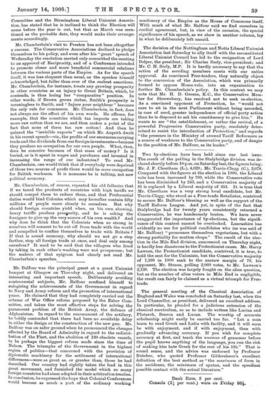Mr. Chamberlain's visit to Preston has not been altogether a
success. The Conservative Associations declined to pledge themselves to his policy, and even after his " great " speech of Wednesday the resolution carried only committed the meeting to an approval of Reciprocity, and of a Conference intended to promote closer and more beneficial commercial relations between the various parts of the Empire. As for the speech itself, it was less eloquent than usual, as the speaker himself acknowledged, but fuller than ever of the rashest assertions. Mr. Chamberlain, for instance, treats any growing prosperity in other countries as an injury to Great Britain, which, he contends, is thus losing her " comparative " position. In other words, if Brown grows richer, Smith's prosperity is meaningless to Smith, and " Injure your neighbour" becomes the only rule for commerce. Mr. Chamberlain, in fact, does not always see the effect of his own words. He affirms, for example, that the countries which tax imports are taking more raw cotton than we are, and then makes a point of the fact that none of them tax raw cotton ! And then he quizzed the "invisible exports " on which Mr. Asquith dwelt in his recent speech—viz., the profits of our enormous carrying trade and the dividends from our foreign investments—because they produce no occupation for our own people. What, then, does he conceive becomes of that mass of money ? Is it buried, or is it spent in wages and purchases and invested in increasing the range of our industries? To read Mr. Chamberlain, one would think that if everybody were deprived of those two sources of profit there would be more occupation for British workmen. It is nonsense he is talking, not new political economy.






































 Previous page
Previous page